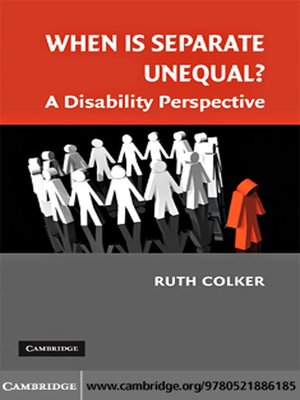When is Separate Unequal?
ebook ∣ A Disability Perspective · Cambridge Disability Law and Policy Series
By Ruth Colker

Sign up to save your library
With an OverDrive account, you can save your favorite libraries for at-a-glance information about availability. Find out more about OverDrive accounts.
Find this title in Libby, the library reading app by OverDrive.



Search for a digital library with this title
Title found at these libraries:
| Library Name | Distance |
|---|---|
| Loading... |
This book does not start from the premise that separate is inherently unequal. Writing from an 'anti-subordination perspective', Professor Colker provides a framework for the courts and society to consider what programs or policies are most likely to lead to substantive equality for individuals with disabilities. In some contexts, she argues for more tolerance of disability-specific programs and, in other contexts, she argues for more disability-integrated programs. Her highly practical investigation includes the topics of K-12 education, higher education, employment, voting, and provision of health care. At the end of the book, she applies this perspective to the racial arena, arguing that school districts should be given latitude to implement more use of racial criteria to attain integrated schools because such environments are most likely to help attain substantive equality from an anti-subordination perspective. The book measures the attainment of equality not on the basis of worn-out mantras but instead on the basis of substantive gains.







